ROS1-positive lung cancer is a type of non-small cell lung cancer (NSCLC) that is caused by a genetic mutation in the ROS1 gene. The ROS1 gene provides instructions for making a protein that helps regulate cell growth and division. When a mutation occurs in this gene, the protein can become overactive and cause uncontrolled cell growth, leading to cancer.
ROS1-positive lung cancer accounts for about 1-2% of all NSCLC cases. It is more common in non-smokers and younger patients. It is also more common in certain populations, such as those with a history of lung cancer in their family, those with a history of lung diseases, and those exposed to environmental factors such as pollution and radiation.
ROS1-positive lung cancer is typically treated with targeted therapy, which aims to block the overactive protein produced by the mutated ROS1 gene. There are several drugs available that have been specifically designed to target ROS1-positive lung cancer, and they have been shown to be effective in treating the disease.
What causes ROS-1 Positive Lung Cancer?
ROS1-positive lung cancer is caused by a genetic mutation in the ROS1 gene. The ROS1 gene provides instructions for making a protein that helps regulate cell growth and division. When a mutation occurs in this gene, the protein can become overactive and cause uncontrolled cell growth, leading to cancer.
The exact cause of the ROS1 gene mutation is not known, but it is thought to be related to a combination of genetic and environmental factors. Some studies suggest that exposure to environmental toxins, such as air pollution and radiation, may increase the risk of developing ROS1-positive lung cancer. However, most cases of ROS1-positive lung cancer are not directly linked to environmental factors.
ROS1-positive lung cancer is more common in non-smokers and younger patients. It is also more common in certain populations, such as those with a history of lung cancer in their family, those with a history of lung diseases, and those with certain genetic mutations.
Overall, while the exact cause of ROS1-positive lung cancer is not fully understood, research into the genetic and environmental factors that contribute to its development is ongoing.
How is ROS-1 Positive Lung Cancer Treated?
ROS1-positive lung cancer is typically treated with targeted therapy. Targeted therapy is a type of cancer treatment that uses drugs to target specific proteins or genetic mutations that are driving the growth of cancer cells. In the case of ROS1-positive lung cancer, targeted therapy drugs are used to inhibit the activity of the ROS1 protein, which is overactive due to a mutation in the ROS1 gene.
There are several targeted therapy drugs available for the treatment of ROS1-positive lung cancer, including crizotinib, ceritinib, alectinib, and entrectinib. These drugs have been shown to be effective in treating the disease, and they have fewer side effects than traditional chemotherapy.
The choice of drug and treatment regimen will depend on several factors, including the stage and extent of the cancer, the patient’s overall health and medical history, and the presence of any other medical conditions. Treatment may involve a single drug or a combination of drugs, and the drugs may be given orally or intravenously.
In addition to targeted therapy, other treatments such as surgery, radiation therapy, and chemotherapy may also be used, depending on the individual case. A multidisciplinary approach, involving a team of healthcare professionals, is typically used to develop a personalized treatment plan for each patient with ROS1-positive lung cancer.
Info Summary – ROS1 Positive Lung Cancer
ROS1 positive lung cancer refers to cases of lung cancer in which the patient is positive for a mutation of the ROS1 gene. The ROS1 gene is responsible for making the protein ROS1, which signals cells to grow and reproduce. If a lung cancer patient is ROS1 positive, the cancer is usually more aggressive due to the ROS1 protein causing more abnormal cells to drive the growth of the tumor. However, ROS1 positive patients may be eligible for checkpoint inhibitors for treatment, which block the mutation from causing the cancerous cells to rapidly grow and divide. Although rare, the identification of the ROS1 alteration can play a major role in the patient’s treatment plan. Other than lung cancer, the ROS1 mutation has been identified in the following cancer types:
-Glioblastoma multiforme
-Bile duct cancer
-Ovarian cancer
-Colorectal cancer
Genetic Testing for ROS1
ROS1-positive lung cancer has only been identified in non-small cell lung cancer (NSCLC), and not in small cell lung cancer. Of NSCLC cases, about 2% of them are ROS1 positive. This has led to an increase in testing for NSCLC patients.
In order to be eligible for targeted therapies, cancer patients need a positive test for the ROS1 mutation. Typically, a tissue sample of the tumor is collected by the doctor and it is sent to a laboratory for results. The tests used for the ROS1 mutation include:
-Fluorescence in situ hybridization (FISH): The most common testing method used, locates specific DNA sequences by exposing chromosomes to a probe with a fluorescent molecule attached. A researcher will be able to identify if the ROS1 gene if the fluorescent probe has been bound to it.
-Multiplex real-time PCR assays: Test that covers a range of fusion genes. Inexpensive and quick results compared to other tests. This test uses multiple probes that can be distinguished from the rest of the DNA sequences.
-Immunohistochemistry: Uses antibodies against the ROS1 protein to detect any abnormalities. This test is for screening to diagnose cancers, so it can be used initially to avoid unnecessary FISH tests.
-Next Generation Sequencing (NGS): Looks at the entire human genome in one test to detect any mutation. NGS is the most comprehensive test available, but may be expensive and time consuming compared to other testing methods.
Go To “Cancer Clinical Trials”…












